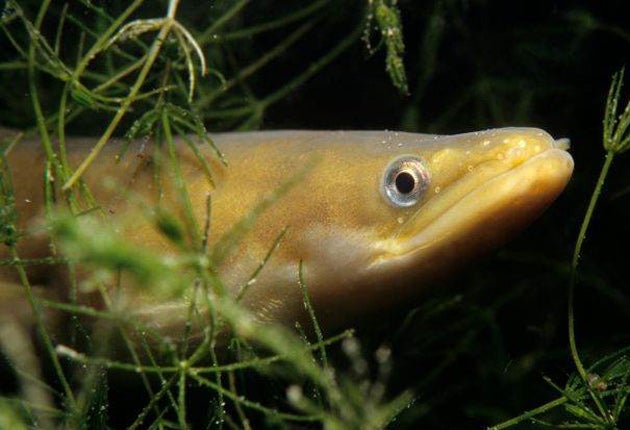Mystery of the disappearing Thames eels
98 per cent drop in river's population in the past five years

Your support helps us to tell the story
From reproductive rights to climate change to Big Tech, The Independent is on the ground when the story is developing. Whether it's investigating the financials of Elon Musk's pro-Trump PAC or producing our latest documentary, 'The A Word', which shines a light on the American women fighting for reproductive rights, we know how important it is to parse out the facts from the messaging.
At such a critical moment in US history, we need reporters on the ground. Your donation allows us to keep sending journalists to speak to both sides of the story.
The Independent is trusted by Americans across the entire political spectrum. And unlike many other quality news outlets, we choose not to lock Americans out of our reporting and analysis with paywalls. We believe quality journalism should be available to everyone, paid for by those who can afford it.
Your support makes all the difference.London's eels, for centuries the staple of Cockney cuisine, are rapidly vanishing from the River Thames, conservationists revealed yesterday.
Over the last five years scientists from the Zoological Society of London (ZSL) have recorded a 98 per cent drop in the number of European eels within the river.
Their disappearance reflects a massive decline right across Europe, which has led to the eel being classified by the International Union for Conservation of Nature as "critically endangered".
No one knows why the eels are disappearing – it may be because of their migratory lifestyle, which sees them swim across the Atlantic to spawn – but there seems to be no doubt about the rapidity of their decline in the Thames.
Every year, ZSL's Tidal Thames Conservation Project places eel traps on a number of the river's tributaries. In 2005 about 1,500 eels were captured, but last year, fewer than 50 eels were seen in the traps.
Conservationists are now concerned that the eel, which, jellied or stewed, or served in eel pies, has been sold as an iconic East London dish for centuries, is no longer returning to the river. "Eels are mysterious creatures at the best of times, but we are very concerned about the rapid disappearance of the species in the Thames," said Dr Matthew Gollock, the manager of the project.
"It's difficult to say what is going on – it could be due to a number of potential factors including changes in oceanic currents due to climate change, man-made structures such as dams and the presence of certain diseases and parasites.
"Other rivers in the UK are also seeing a European eel population decline – so it seems to be a worrying trend."
Scientists believe that European eels originate from the Sargasso Sea in the Atlantic Ocean and can spend up to three years travelling to their designated waters in Europe. They remain in river catchments, such as that of the Thames, for up to 20 years before they make their mammoth 4,000-mile return voyage back to the Sargasso Sea to spawn and die.
European eels and flounders were the first two fish species to re-colonise the Thames River after the estuary was considered biologically dead in the 1960s.
Conservationists believe that any serious and rapid collapse of the eel population could have a knock-on effect for other species in the river.
"Time appears to be running out for eels in the River Thames and this could have a domino effect on other Thames species," said Dr Gollock. "We need to understand why this decline is occurring so we can be in with a chance of saving this extraordinary animal."
Join our commenting forum
Join thought-provoking conversations, follow other Independent readers and see their replies
0Comments